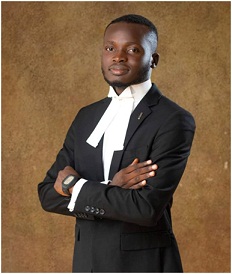Rights of arrested person in custody
Bamidele Kolawole
Rights are legal, social, or ethical principles of freedom or entitlement; that is, rights are the fundamental normative rules about what is allowed of people or owed to people according to some legal system, social convention, or ethical theory. The Rights of an arrested person in custody are as provided for under both the Constitution of the federal Republic of Nigeria and the Administration of Criminal Justice Act and the State versions. Most important among these rights is the Right to BAIL Pending Arraignment.

The Rights of an arrested person in custody are as provided for under both the Constitution of the federal Republic of Nigeria and the Administration of Criminal Justice Act and the State versions. Most important among these Rights is the Right to BAIL Pending Arraignment.
As it is presumed as provided for under the Constitution, that the arrested person is innocent until the contrary is proved beyond reasonable doubt, this is the right referred to as presumption of innocence.
The arrested person has the right to be brought to court within 24 hours, just in case the alleged offence is not one that can be availed Administrative BAIL, i.e, Police BAIL or any other Bail not by the Court.
If the arrested person is not brought before a Court of competent Jurisdiction within the constitutionally stipulated time, the holding authority, would be violating the Right to Liberty of the arrested person.
In most cases, the holding authority may claim to still be conducting investigation, they have no such power, as the arrested person can bring civil action against them under Fundamental Right Enforcement Procedure (FREP) Rules, hence it is better and advisable that the arresting authority conduct and properly conclude investigation in search of evidence before making arrest.
Also, the arrested person has the right to a LEGAL REPRESENTATION, who will observe procedure of taking the statement under caution volunteered by the arrested person. The arrested person is not to be forced or coerced into making statement or confessing.
Mind you, these rights are restricted to while the person is in custody, presumably before been taken to Court, because, the moment the person enters Court, there could be some Derogation from these rights under certain conditions, which consequently would modify the range of the Rights earlier mentioned. Nevertheless, being arrested does not automatically mean that the arrested person is guilty, as there is every possibility of him or her being innocent.

A person arrested on suspicion of commission of an alleged offence is by far a suspect at the police station. The objective of an arrest is to bring the person arrested before a court and to punish the guilty and declare freedom to the innocent.
Thus, a person arrested enjoys certain rights as enshrined under the constitution of the Federal Republic of Nigeria and some other subsidiary legislations and international treaties.
Right to Silence: A Suspect cannot be compelled to say anything. He can avoid answering any question put to him until he makes consultation with his legal practitioner. Section 35(2) of the 1999 Constitution of the Federal Republic of Nigeria.
Right to dignity of human person: A suspect at the police station is not to be subjected to inhumane and degrading treatment while he is in custody.
Torture at the police station to aid confession, subjecting suspect to unhygienic conditions, exposure to unfavourable and harsh weather conditions are some of the inhuman treatments faced by detainees. Section 34 CFRN 1999.
Right to an interpreter at no cost: where the suspect does not understand English language, an interpreter shall record and read over the statement of the suspect to his understanding. The suspect and the interpreter shall endorse the statement. S 60(3) Police Act 2020.
Right to freedom from unnecessary restraint: S5 Administration of Criminal Justice Act 2015, A suspect may not be handcuffed except there is reasonable apprehension of violence or attempt to escape; the restraint is considered necessary for the safety of the suspect or defendant; or by order of the court.
A suspect can only be tried for an offence known to the law.
The offence must be constituted as at the time of the commission of the offence
He equally has the right to be brought before a court of law within a reasonable time.
Not beyond 24hours and in any other case, a period of two days or such longer as in the circumstances may be considered by the court to be reasonable. S 35(4)(5) CFRN.

By virtue of Section 36 (5) of the Constitution of the Federal Republic of Nigeria, 1999, any person charged with an offence is presumed to be innocent until he is proved guilty. The implication of this constitutional provision is that a suspect, an accused person or a defendant in any criminal Investigation or charge is presumed to be innocent until the contrary is proved.
It therefore connotes that such a suspect, accused person or defendant still have the right to enjoy all fundamental rights that could be enjoyed by any other citizen of the country.
Such a person is entitled to bail especially in offences such as misdemeanors and offences whose punishment is not capital in nature (death sentence).
A person arrested for any offence is entitled under the Constitution to be informed of the nature of the offence while being arrested. He has the right to remain silent if he so desires.
He is also entitled to have access to the service of a legal practitioner of his own choice. See Section 36 (6) (c) of the Constitution. Like any other Nigerian, he must not be subjected to any form of torture, inhuman or degrading treatment. See Section 34 of the Constitution.
This is the more reason why we are advocating against any form of torture for the extraction of extra judicial statements from accused persons.
In summary, any person arrested is entitled to all the rights that any Nigerian could enjoy under the Constitution save for right to personal liberty in the case of person charged with a capital offence

Rights are legal, social, or ethical principles of freedom or entitlement; that is, rights are the fundamental normative rules about what is allowed of people or owed to people according to some legal system, social convention, or ethical theory. Section 36(5) 1999 Constitution as amended presumes a person in custody innocent of the allegation against him/her until the contrary is proved, as such, his rights are still intact until there is a pronouncement of court convicting such suspect of the allegation against him.
The fact that a suspect is in custody for an alleged offence does not extinguish his rights as a human being.
Section 8 of the Administration of Criminal Justice Act provides that any person arrested shall not be subjected to inhumane or degrading treatment.
There are various rights available for a suspect while in custody and these are:
1.Rights of defence: A suspect in custody has the right to defend himself or herself in person or through a counsel of his/her choice.
2. A suspect or an accused has the right to have counsel present at all stages of the criminal proceedings, including during interrogation and during pretrial proceedings.
3. A suspect in custody shall be presumed innocent until the contrary is proved, and shall enjoy the right to be heard by himself and counsel, to be informed of the nature and cause of the accusation against him, to have a speedy, impartial, and public trial if the case gets to court, to meet the witnesses face to face.
The presumption of innocence is contained in international and regional instruments
such as the Universal Declaration of Human Rights (Article 11), the International
Covenant on Civil and Political Rights (Article 14[2]) as well as the 1999 Constitution as amended. Guilt of a suspect in custody cannot be presumed before the prosecution proves a charge beyond reasonable doubt, and this principle applies until the judgment is made final.
There are a number of ways in which the presumption of innocence can be protected. First, the presumption is breached where public officials prejudge the outcome of a trial. Public officials include judges, prosecutors, the police, and government officials, all of whom must avoid making public statements of the guilt of an individual prior to a conviction or after an acquittal. It is permissible, however, for the authorities to inform the public of the name of a suspect and that the person has been arrested or has made a confession, as long as the person is not publicly declared guilty.
A second element in protecting the presumption of innocence relates to the burden of proof. The burden of proof refers to which party will have the burden of proving a particular fact or set of facts.
In order to protect the presumption of innocence, the burden of proof is on the prosecution. See Section 131-136 of the Evidence Act, 2011.
A third way in which the presumption of innocence can be maintained relates to how the suspect or accused person is presented. A suspect or accused person should not be made to look like a guilty person by being caged or shackled in the courtroom or forced to appear in court wearing a prison uniform or with his or her head shaved.
If possible, the accused should be allowed to dress in civilian clothes for the duration of the trial. The presumption of innocence will not be violated where the accused person needs to be handcuffed or restrained to prevent his or her escape or to maintain the general security of the courtroom.
4. A suspect has the right to remain silent while in custody and if he wishes to write his statement he can demand to do so in the presence of his counsel.
No person may be compelled to testify against himself or herself or to confess guilt.
No negative inferences may be derived from a person’s failure to testify against himself or herself or to confess guilt. The right not to be compelled to testify against oneself and the right not to confess guilt are expressed in Article 14(3)(g) of the International Covenant on Civil and Political Rights, Section 35(2) 1999 Constitution as amended.

The Rights of an Arrested Suspect in the Custody of the Police is a birth right derived from our 1999 Constitution of the Federal Republic of Nigeria as Amended.
This rights said fall under the categories of rights also known as the Fundamental rights under the Chapter 4 of the same 1999 Constitution, every Citizen of the Federal Republic of Nigeria, they are guaranteed as follows,
Section 33 , guarantees every citizen of the republic the right to life, in respective of any criminal Ccarges the individual is arrested for, for the defence of that person from unlawful arrest, torture, unimaginable circumstances.
This section guarantees every citizen of the Republic rights to dignity of human person, no individual shall be subjected to human torture, degrading treatment, or perform any act compulsory outside his or her consent.
Section 35:
This section guarantees every citizens rights to personal liberty, every Citizen arrested should be given opportunity to his or her liberty, except on the areas where such individual has committed a Capital offence and where the individual if granted bail may escape justice or Frustrate Justice, such individual may not enjoy such benefits or when there is an order from a competent Court for the Police to detain Such individual.
The individual arrested shall be informed in writing within 24hours and in the language he or she understands of the facts and grounds of his or her arrest or detention.
The individual who is arrested or detained above shall be brought before a court of law within a reasonable time
Any person who is unlawfully arrested or detained shall be entitled to compensation and public apology from the appropriate authority or person.
Section 36:
Every citizen shall be entitled to the rights of fair hearing by the police upon being arrested, fair hearing enables the individual to prepare for his defence, for the fact that the constitution provides all, any individual charged or arrested for any Criminal offence brought before the police or court is presumed to be innocent until he or she is proved guilty.
Section 3 of the Administration of Criminal Justice Law of Ondo State 2015
The police officer or the person making the arrest or the police officer of a station or any law enforcement agency shall inform the person arrested of his rights to remain Silent and to avoid answering any question until after consultation with a legal Practitioner or any person of his choice
Section 4 of the ACJL of Ondo State further guarantees that no person shall be arrested in lieu of any other person, under any circumstances.
Section 5:
A person arrested shall not be handcuffed or subjected to unnecessary restraint except by order of the court.
Section 6: Any person arrested shall be accorded humane treatment, having regards to the dignity of his person.
No person shall be arbitrarily arrested or arrested on allegations that borders on civil breach of contract.

To start with, fundamental human rights is an inalienable that is innate to every individual. These rights are universally recognized and codified in different conventions and enactments. In Nigeria, these rights are majorly provided for under Chapter 4 of the 1999 Constitution of the Federal Republic of Nigeria (As Amended).
Some of these rights particularly in relation to the subject of discussion include: (1) Right to personal liberty and (2) Right to fair hearing.
In the event the individual’s right has been or is being infringed upon by any person, he has the right to seek redress in a competent court of law to enforce his fundamental rights in line with Section 46 (1) of the 1999 Constitution of the Federal Republic of Nigeria (As Amended) 2010.
Suffice it to say that pursuant to Section 35 (1) (a) of the 1999 Constitution of the Federal Republic of Nigeria (As Amended), every person is entitled to his personal liberty save in execution of the sentence or order of a court in respect of a criminal offence of which he has been found guilty.
It follows therefore that where an individual is in custody (either Police Custody or Prison Custody) without being tried and found guilty of a criminal offence by a court of law, such person’s right could be said to have been breached and he has a right to enforce his fundamental human rights in line with the principle of fair hearing as enshrined in Section 36 (1) the 1999 Constitution of the Federal Republic of Nigeria (As Amended).
Furthermore, Section 36 (5) provides that: Every person who is charged with a criminal offence shall be presumed to be innocent until he is proved guilty.
In conclusion, the law empowers an individual who is detained to seek redress in a court of law and is entitled to be admitted to bail either conditionally or unconditionally.
In the event the individual is not admitted to administrative bail at the Police Station, he must be charged to court within a “reasonable time” which must be one day where the distance of the custody to the court is within a radius of 40kms and 2 days where it is otherwise. He would then be granted bail by the court.
He is also entitled to defend himself in person or by legal Practitioner of his choice as well as adequate time and facilities for the preparation of his defence amongst others.

An innocent person or criminal can be arrested or invited to the police station on one matter or the other. When a person is taken to a police station for the commission of an alleged offence or on reasonable suspicion of being about to commit a crime, he is entitled to the following rights under the constitution and other subsidiary legislation, presently in force: Right to bail – the right of a suspect to bail is a constitutional right fully guaranteed.
1. which provides that a suspect is entitled to be released with or without conditions, even if further proceedings may be brought against him, within a period of a day or two days of his arrest and detention, as the case may be.
Right To Private Legal Advice – An accused person or a suspect, who is under arrest or detention, has a right to counsel guaranteed
2. while under arrest or being held at the Police station.
The section provides: The import of this provision is that an accused person is at liberty to insist on talking to a lawyer before making a statement or being subjected to interrogation at the Police Station.
It is therefore illegal for the Police to compel an accused or suspect to talk or make any statement, against his wish to consult a lawyer first, before doing so.
Such a person shall have the right to remain silent or avoid answering a question until after consultation with a legal practitioner or any other person of his own choice.
He has the right not to be arrested by use of excessive force – The police have no right to beat any person and using reasonable force.
To enforce compliance does not include pummeling (striking repeatedly with the fists) a person into a pulp especially when the suspect is not resisting arrest or after arrest.
He has the right to be notified of the cause of arrest – Unwarranted and unnecessary detentions run contrary to the ideals of the Fundamental Rights provisions in Chapter IV of the 1999 Constitution.
He has the right to be taken to a police station – A suspect should be taken to a police station and the police have no right to deny a suspect access to his/her lawyer at all times.
He has the right to be brought before a court of law within a reasonable time – Every detention beyond 24 hours must be authorized by a court of law.
A suspect can only be tried for an offence known to law – The offence must be defined by legislation prohibiting it.v

Article 22(2) of the Constitution states, “A person who is arrested shall not be detained in custody without being informed the grounds of the arrest nor shall he be denied the right to consult, and defended by a legal practitioner (lawyer); of their choice.”
Section 35(2) of the CFRN 1999…”any person who is arrested or detained shall have the right to remain silent or avoid answering any question until after consultation with a legal practitioner or any other person of his own choice”
35(3) right to be informed of his offence in writing in the language he/she understand within 24 hours.

The Black’s Law dictionary (Ninth Edition) defines right as that which is proper under the law, morality, or ethics.2. something that is due to a person by just claim, legal guarantee, or moral principle. 3. A power, privilege, or immunity secured to a person by law.
It is a right given to every citizen that is devoid of discrimination, sentiment and status. It is an inherent right, not a privilege, the right refers to in this discourse has to do with the fundamental rights of persons in custody.
The same Black’s law defines fundamental right as a right derived from natural or fundamental law. 2. Constitutional law. In Badejo v. Min. of education, Per Kutigi, J. S. C. said that A Fundamental Right is certainly a right which stand above the ordinary laws of the land, but I venture to say that no fundamental right should stand above the country, state or the people.”
Back to the topic in tapis, the rights of arrested persons must be well guided because they are still human and most especially citizens of Nigeria, therefore, they deserve respect and regard but however few of their rights must give way in custody.
There are 11 Fundamental rights available to any citizen of Nigeria, which are listed in Section 4 of the 1999 Constitution of Federal Republic of Nigeria as amended.
It is imperative to clear the air at this juncture that the following rights out of the 11 must certainly give way in custody; viz:
Section 34 – Right to dignity of human person
Section 35 – Right to Liberty
Section 37 – Right to private and family life
Section 40 – Right to peaceful assembly and association
Section 41 – Right to freedom of movement
Section 42 – Right to freedom of discrimination.
In fairness, anybody in custody must still be treated with respect because he/she is not yet condemned by the court even those ones that are already condemned must be seen as human beings and so should be treated same, it is saddened to note that in Nigeria vital human rights are often and frequently violated by our agents responsible, first and foremost, looking at rowdy and dirty environment and the harsh conditions they are exposed to in terms of feeding, sleeping and the condition in our various cells and prisons.
Basically, the rights to dignity of persons is being tortuously violated, this is very disheartening.

The facts that someone is in custody does not mean that the person does not have some right like; right to dignity of human person, right to the counsel of his or her choice, right to make statement or not to make statement, right to be informed of his alleged offence etc as enshrined in Chapter IV of the constitution of the Federal Republic of Nigeria 1999 as amended.
Section . 34 of the Constitution talks about dignity of human person.
Section 35. of the constitution of Federal Republic of Nigeria talks about personal liberty, meaning that the person is entitled to administrative bail if the person cannot be arraigned to court within the constitutional stipulated time.

This simply means that the police have the duty to protect the fundamental rights of a suspect which includes the right to liberty of a person, right to remain silent, right to be informed of the facts and ground of arrest and right to be brought before a court within a reasonable time.
If it’s a bailable offence, bail must be granted in 24 hours and not more than 48hrs if it’s a weekend, otherwise suspect must be brought to court.










